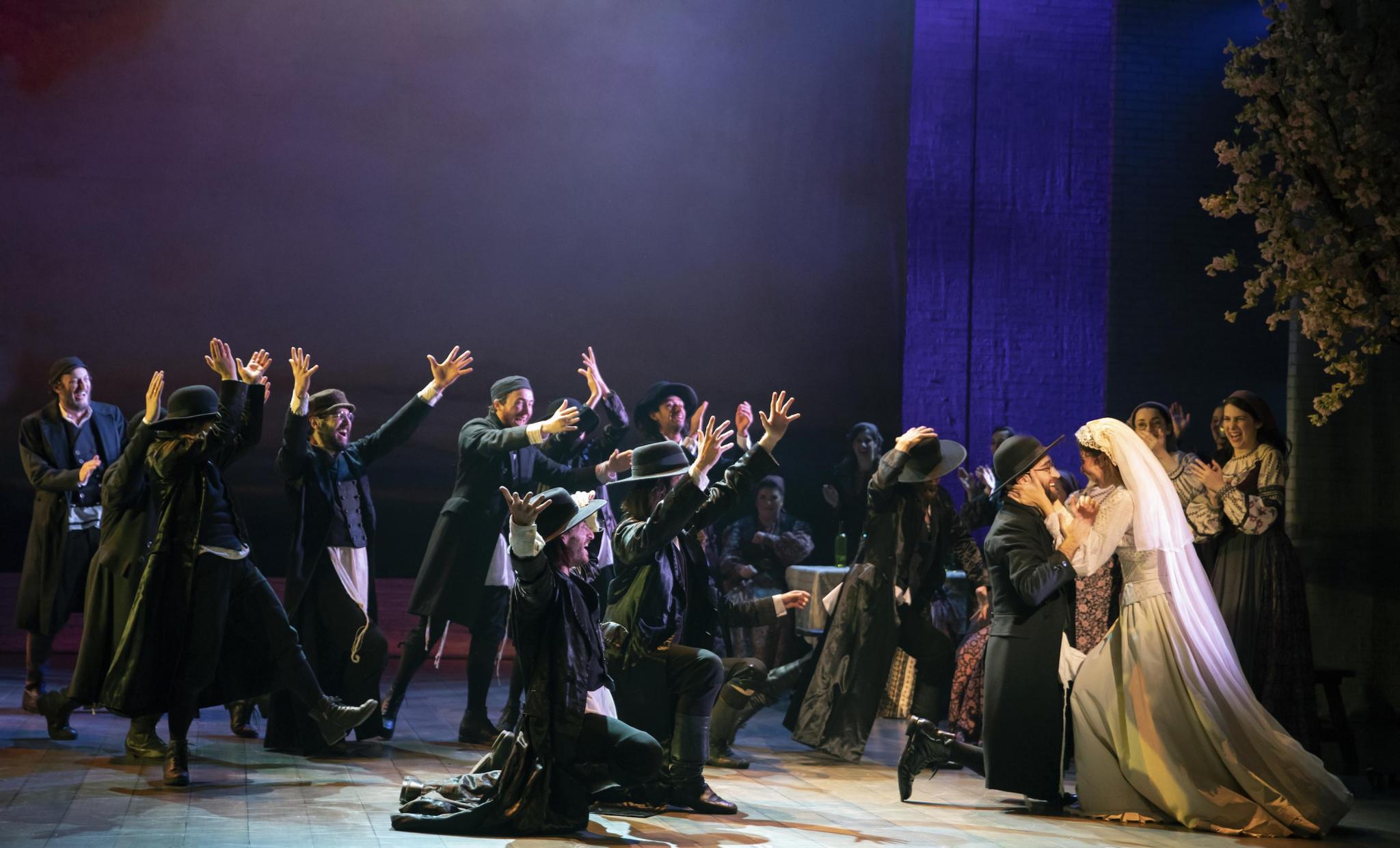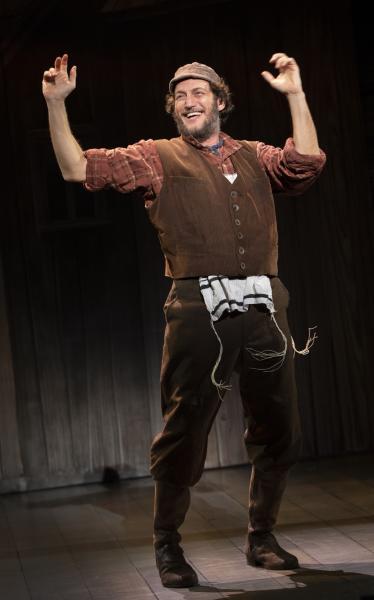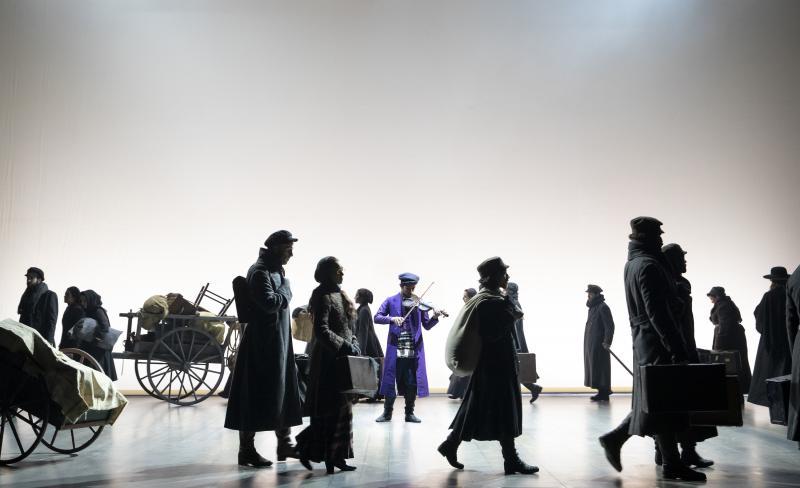
"Fiddler on the Roof," will open at Bass Concert Hall on Tuesday, April 2. The Broadway production centers around the Jewish community in the Russian shtetl of Anatevka in 1905. At left, the main character Tevye's eldest daughter Tzeitel and Motel, the tailor, celebrate their wedding, as one of the central romantic plots in the production. Photos by Joan Marcus
'Fiddler on the Roof' A relevant story between head & heart
In 1964, when “Fiddler on the Roof” first opened on Broadway, audiences embraced the show as a timeless, heartwarming story about the Jewish community. At that time, it was the first musical in history to surpass 3,000 performances, and the show won the 1965 Tony Award for Best Musical in addition to eight other Tony Awards that year.
Fifty-four years later, “Fiddler on the Roof” continues to draw eager audiences to the theater with its celebration of life, community and tradition. According to Yehezkel Lazarov, who headlines as Tevye, there is an essential reason why this is still true.
Lazarov compares Fiddler to a stereographic photo, one in which a simpler image overlays a deeper, more profound statement about humankind.
“It’s very easy to look at Fiddler as a Jewish community story that talks about tradition,” Lazarov says. “But this is the clear picture on top. If you look at it while glazing your eyes, then suddenly, the dragon will come out.”
So, yes. At its heart, Fiddler tells a story about a Jewish community in rural Russia. It’s the tale of Teyve, a milkman, his wife, Golde, and their five daughters, all of whom will one day marry. But overlayed across this basic plot are the conflicting themes of tradition, religion, logic and the heart.

Yehezkel Lazarov as Tevye performs one of the most popular songs from the production "If I Were a Rich Man."
Within this layered tapestry, the timelessness of the play’s design reveals itself. Fiddler becomes not only a story about people who lived a hundred years ago, but also present-day communities who strive to hold onto their homes through precarious times.
“It’s a very, very relevant story,” Lazarov said, “because as we speak, there are still, a hundred years later, people flowing out from their homes and their lands, the places they feel they belong to. To watch Fiddler and not to see these things is to choose to be blind.”
Lazarov relayed that this message is one that the play’s Director Bartlett Sher wanted to bring to the forefront of this revival of Fiddler.
“That’s why I’m beginning the play as a modern man, with the red symbol of a refugee,” Lazarov says. “Storywise, it’s relevant because everything is very real.”
Another aspect of the show that Lazarov hopes to portray with true sincerity is his character, Tevye.
“When I read it in the beginning, the first thing that came to me is how much the character is caring about everything,” Lazarov says. “To be a caring man, it means to do things from the heart. That’s the whole thing about Tevye and his character, the thin line between the heart and the thoughts. That dialogue is something we’re going through in life.”

Tevye's three eldest daughters Chava, Tzeitel and Hodel, played by Natalie Anne Powers, Mel Weyn and Ruthy Froch, perform "Matchmaker, Matchmaker."
As an actor, director and multi-disciplinary artist, Lazarov has endeavored to explore the line between thought and emotion. He began performing on stage at the age of six and has since starred in over 40 stage productions, movies and TV shows. Additionally, Lazarov is the artistic director and co-founder of Studio Ankori Middle and High School for Creative Thinking and Entrepreneurship. He has also written and directed several short films, in addition to touring with “Fiddler on the Roof” with his wife and daughters.
“[Tevye] is always there, in between, asking himself, ‘On the other hand…?’” Lazarov says. “I’m a person like this. I’m a person that doubts everything. When I’m directing, when I’m working on other projects, I doubt. Doubting is a sign of thinking, of not being blind to things. We want people who will question themselves.”
Which is what “Fiddler on the Roof ” aims to do. It pushes audiences to look beyond the everyday story to the larger question, the one that lives between logic and the heart. Do we choose tradition, because it’s what others before us have done? Or do we side with the heart in order to preserve the family?
Over 50 years later, Fiddler still holds a place in our hearts, because it continues to ask us these questions.
“Fiddler on the Roof” opens at Bass Concert Hall in Austin on Tuesday, April 2 at 8 p.m. and will run until Sunday, April 7 at 7 p.m., with matinees on Saturday, April 6 at 2 p.m., and Sunday, at 1 p.m.

As the Jews leave Anatevka in anticipation of a pogrom, a fiddler plays strains in a crowded street.
Tickets start at $30 and are available at Broadway in Austin's website, Texas Performing Arts' website, the Bass Concert Hall ticket office, all Texas Box Office Outlets and by phone at 512-477-6060. For groups of 10 or more, call 877-275-3804 or email Austin.groups@broadwayacrossamerica.com.











